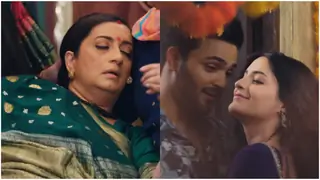TRACK TUNE DIPLOMACY
On Pakistan's I-Day & the 60th anniversary of partition, DTexplores India's current fascination with Pak and its music, and the love-hate ties that define it, as they do all things involving our neighbour
ANSHUL CHATURVEDI
Do you make endless calls to arrange passes when Rahat Fateh Ali Khan or Atif Aslam are to perform at a concert? Do you walk into a music shop and inevitably find yourself drawn to the latest album by Abida Parveen, or browse to see if there's anything missing from the collections of Nusrat Fateh Ali Khan, Ghulam Ali and Mehdi Hasan that you have built up over the years? Do you stop changing channels on FM when the 127-kg-leaner Adnan Sami launches into his latest number, and even know that he's recently re-united with his estranged wife?
If you do, there, that proves the point! Despite the two governments being at daggers drawn for decades, the Indian audience has been steadily accepting and embracing an ever-increasing number of Pakistani artistes from an increasing variety of fields. Pop bands and solo singers, Sufi exponents, comic artists, cricket stars and commentators, fashion designers – their "soft power" presence is all around you, in fact, you hardly notice it as something out of the ordinary anymore.
'THERE'S A MARKET, THEY ARE MAKING GOOD USE OF IT'
Pakistani music artistes have found not only an appreciative, enthusiastic audience in India but also a good market, in most cases, far bigger than that in Pakistan itself. Industry sources suggest that the current hot star, Atif Aslam, has sold about 3,00,000 albums in India so far. Adarsh Gupta, the CEOTimes Music says, "The figures are big when it comes to Pakistani singers, somebody like an Abida Parveen has earned a significant amount with Times Music alone. There is a market here, and these artistes are making good use of that."
Pakistani pop bands in particular have had a rocking time. Junoon, Jal, Strings, Fuzon, to name a few, have been mobbed by frenzied teenyboppers at concerts on a regular basis. Singers such as Ali Azmat, Ali Haider, and more recently Rahat and Atif, are rock stars in their own right.
'THEY ARE HERE BECAUSE THERE IS NO SCOPE THERE'
While the popularity of the younger Pakistani artistes is unquestionable, there are artistes within the Indian music fraternity who are not too happy at this trend. Issues such as work permits, reciprocal treatment, loss of earnings due to piracy in Pakistan, and the fascination with outside stars at the cost of local talent, worry them.
Ghazal maestro Jagjit Singh isn't too impressed with the current inflow of Pak talent. "They are here in India because nobody cares for them in Pakistan", is his opening line on the issue. He goes on to elaborate, "Our attitude is that whatever is imported is good, so they are all becoming hits. Many of them are from families that are into music as a tradition, not many are well educated, they can't hope to make it big there. Adnan is not in that category, but he is more famous for issues about his weight than for his singing. Rahat is a good singer, but frankly, not many others are." His views on performing in Pakistan are rather dim as well. "There is a lot of red tape when an Indian has to go there", he says, and adds, "In contrast, the Indian government has given an open visa to Ghulam Ali, that is a healthy approach."
Music director Ismail Darbar reaffirms the issue when he says, "It's sad that while we accept Pakistani musicians with an open heart, it not so the other way round. We have always treated them like family. I hope we also will be able to go there and perform in front of our friends." He raises another concern: "While Pakistani musicians here are earning legally, most of our work sold there is pirated, we earn nothing."
'CULTURAL EXCHANGE OR EMPLOYMENT?'
Singer Abhijeet has been a critic of this "one-sided cultural exchange" for some time. He argues that "There is a difference between cultural exchange and providing employment. These Pak musicians come here as non-entities and become big stars. Why can't we give a platform to our own talent like an Abhijeet Sawant or a Debojit instead?" He adds, "There is no music industry in Pakistan, that is why artists there dream making it big in India. If we go to Pakistan, we get a visa for three days, and on each day we have to report to the local police. But Pakistani stars have practically settled in India. Do they even have work permits?"
'IN INDIA, POLITICAL DIFFERENCES DON'T EXTEND TO THE PERSONAL LEVEL'
Strings' star Faisal Kapadia recounts his experience of his first tour to India. "When I came to India for the first time, Kargil had just happened, but in spite of that the response and love I got from Indians was amazing. Political differences were there, but they did not extend to the personal level. It's been eight years since then, and the love and affection I have got from Indians has only grown." He denies that Indians don't get opportunities to perform in Pakistan, explaining that "I agree that its not happening frequently but artistes like Daler Mehndi, Sukhbir, Alka Yagnik and Abhijeet have performed here. We have only Karachi and Lahore to hold concerts, so sometimes due to security concerns, events are cancelled." He adds, "The countries are involved even in cricket but then one team has to lose; in music it's only a win-win situation."
That perhaps sums it up. On the battlefield, the interaction between Pakistan and India is bloody. On the cricket pitch, it is sport, but one side has to lose. On the platform of music,
irrespective of the rights
and wrongs, it is the music
lover who will always be
the winner. The cliche that
music knows no boundaries
isn't just a cliche, here at least.
I have got a lot of love in India. Indian artistes perform in Pak too but events there are cancelled at times because of security issues
The Pakistani singers are here because nobody cares for them back home. But there is a lot of red tape when an Indian has to go there




























